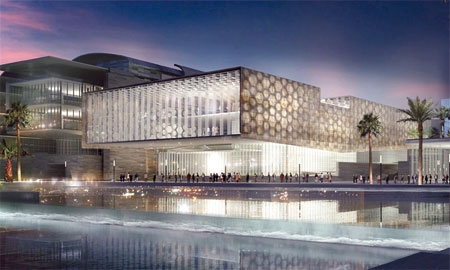One of the first steps to becoming a knowledge-based society is the establishment of a world-class public university that not only provides students with an education, but also generates knowledge. Launched in 2009, the King Abdullah University of Science and Technology (KAUST) is one such institution.
Home to the country’s first mixed-gender campus, KAUST is spread across 14 square miles of the Red Sea coast at Thuwal, around 50 miles north of the commercial center of Jeddah. It features state-of-the-art labs, encompasses a marine sanctuary, and has one of the fastest supercomputers on the planet. In June 2010, the innovative and sustainable architecture of the KAUST campus received a platinum rating on the Leadership in Energy and Environmental Design (LEED) scale, produced by the U.S. Green Building Council.
By 2020, KAUST aims to be renowned for “cutting-edge, basic and goal-oriented research in science and technology, comparable to that of the world’s top 10 science and technology universities.” The research-orientated graduate school is backed by a perpetual endowment, or waaf, of $10 billion – one of the largest in the world – and is a key part of the government’s plans to encourage open research and development in Saudi Arabia.
KAUST IS A KEY PART OF THE OIL-RICH KINGDOM’S EFFORTS TO DIVERSIFY ITS ECONOMIC BASE AND TRANSFORM ITSELF INTO A GLOBAL HOTSPOT FOR SCIENTIFIC AND TECHNOLOGICAL RESEARCH AND DEVELOPMENT
ITS BUILDINGS HAVE BEEN DESIGNED TO UTILIZE NATURAL LIGHT AND VENTILATION, WITH ROOFS CAPABLE OF SUPPORTING 12,000 SQUARE METERS OF SOLAR PANELS TO PRODUCE 3,300MW OF CLEAN ENERGY EVERY YEAR
|
In his message to the university, Custodian of the Two Holy Mosques King Abdullah Bin Abdulaziz Al Saud states: “As a new ‘House of Wisdom,’ the university shall be a beacon for peace, hope, and reconciliation and shall serve the people of the kingdom and benefit all the peoples of the world in keeping with the teachings of the Holy Quran, which explains that God created mankind in order for us to come to know each other.
“It is my desire that this new university become one of the world’s great institutions of research; that it educate and train future generations of scientists, engineers and technologists; and that it foster, on the basis of merit and excellence, collaboration and cooperation with other great research universities and the private sector.”
Activity at KAUST focuses on impact rather than quantity and recent projects centered on energy, food, water and the environment at the institution are already producing results. Researchers have developed “molecular scissors” that could improve the quality, yield and disease resistance of crop varieties, with profound implications for agricultural science worldwide.
Hybrid elastics research at KAUST has entailed the design of a new elastic material and was carried out in conjunction with the Hong Kong University of Science and Technology (HKUST) and Soochow University in China. The collaboration has produced a new type of metamaterial that blurs the line between a liquid and a solid.
Also, scientists at the university are looking to utilize the country’s year-round solar radiation to provide potable water. While visiting the university’s Water Desalination and Reuse Center (WDRC), Professor Kim Choon Ng of the National University of Singapore (NUS) and his team are working to introduce solar-powered water desalination technology to Saudi Arabia that, according to Prof. Ng, in principle can be run from anywhere and would be hugely beneficial for the kingdom.

0 COMMENTS